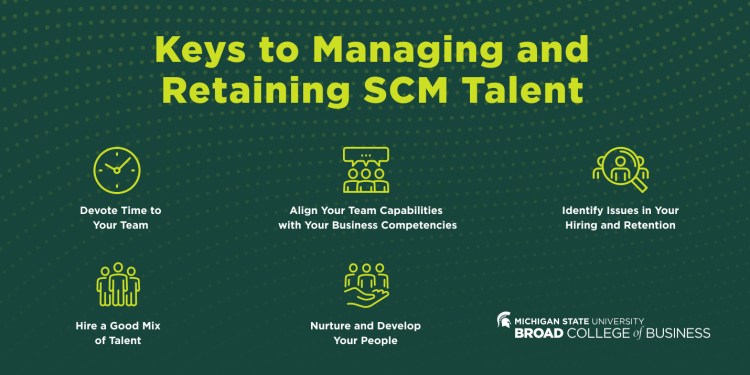Growth Opportunities Key to Retaining Supply Chain Professionals
Last Updated April 7, 2023

Demand for supply chain professionals exceeds supply by about 6 to 1, making it difficult to not only attract new employees, but to keep the ones already on board.
Retaining top supply chain talent is an area of concern for executives, as researchers at Michigan State University in partnership with the APICS Supply Chain Council, found in their Supply Chain Management: Beyond the Horizon project. With insights from more than 50 organizations in North America, Europe, Africa and Asia, the study revealed how succession planning and talent development in the supply chain field are some of the challenges organizations face.
Nick Little, Director of Railway Education in the Center for Railway Research and Education and former Assistant Director of Executive Development Programs at Michigan State University’s Broad College of Business, spoke about the opportunities for firms to develop their supply chain talent at the SCOPE Supply Chain Summit.
“We actually feel pretty good about succession plans for our replacements but it’s going down that next level and making sure we keep really good folks around” to eventually move into other positions within the organization, he said.
Companies should make retaining mid-level employees a priority because they reflect an organization’s future bench strength, and leaders need to spend time identifying potential successors.
“You’ve got to make sure that if you’re going to keep people, you’ve got to look after them,” Little said, and that means more than offering a nice salary and bonus.
One way is to establish a career path that encourages employees to learn and grow in their current position or move into one that matches their capabilities. That could involve spending time in areas of supply chain outside of their expertise (e.g., a procurement specialist working in logistics), as well as other functions of the business (e.g., marketing or finance). Education is a great way for organizations to empower employees to devise solutions, Little said.
Develop T-Shaped Skills in Existing Employees
It is crucial for supply chain professionals to adopt a broad, strategic mindset – no matter their specific function along a supply chain – as the knowledge gained from cross-functional relationships can position an organization to successfully respond to changes in the marketplace. Developing these “T-shaped” professionals requires both experience and education in executing operational tasks and as well as understanding strategic integration or overview.
For example, a supply chain analyst studying forecasts based on previous numbers has to do more than simply consider the accuracy and variability of the figures, according to Little. They need to ask the right questions of the information collected, and advise the rest of the organization the appropriate decisions to respond to market changes. Analysts can provide valuable insights to help supply chain partners find new market sectors when faced with surplus material.
“It’s very critical to encourage people to see the big picture,” Little said, and T-shaped skills will come from people being inquisitive about seeing the big picture.
Develop the Big Picture of Supply Chain Management

